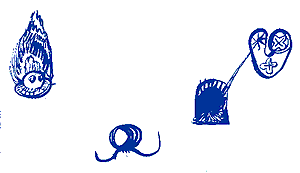Tag: poetry
No longer I:
30 September 2001 | Fiction, poetry
From Voittokulku (‘Triumphal march’, Tammi, 2001). Illustrations by Jukka Korkeila
Tiamat [Bloody moon]
The goat’s cheese that I have just succeeded in swallowing is now grazing in my gullet before its last metamorphosis. Soon it will be washed away into the endless system of tubing, the network of veins that proliferates beneath the paving stones. The body expels the waste and another receives it. Some people believe they are different bodies, but on thorough examination it is clear that they are both part of one and the same liquid-channeling system. I speak of a body which is a city, of liquids which surge beneath the streets, of subterranean waters. I lift a manhole cover and behold a sea which you could never dream of. The sea is a living creature and knows me better than I do myself. When I close my eyes, I see a crayfish that climbs out of the water and stretches out its pincers toward a bloody moon. What does it mean? Of that I do not wish to speak a single word.

Geneswing
30 June 2001 | Fiction, poetry
Poems from Tuulen vilja (‘Windcrop’, WSOY, 2000)
Longbeaked birds
created for the deepfunnelled gloxinia – everything exactly right.
The sport of colours, survival (though I always felt I was
sunset in the morning).
I walk over the living, the playful swing of genes,
uniqueness in splinters: capsules,
family trees, root systems, leafage.
In the geneswing little deviations of dimension,
as if I were perpetually outlining waves with my finger.
The primal miracle of seeds: I press
a mixture of summer flowers in the soil, exploding
a serial miracle. More…
A fifth season
30 December 2000 | Fiction, poetry
Poems from Elävän mieli (‘A mind alive’, WSOY, 1999). Introduction by Lauri Otonkoski
In sparser gusts of wind
metaphors sough through the mind,
spinning as on the much-frequented
boulevards of a great park.
Even one’s most private thoughts are as common
as public transport, what a relief,
as shared as our anatomies and our bacteria,
for there is only one thread in the skein of the Norns
and the same fabric is always being woven
from the whims of fate: is that not a relief?
Treacherous individuality suffices only
for a fingerprint.
Metaphors always the same,
but constantly born anew
like a mind alive. More…
Until the sun rises
Issue 3/2000 | Archives online, Fiction, poetry
Poems from Rakkaus tuli kun lähdin maan ääriin (‘Love came when I left for the ends of the earth’, Tammi, 2000). Introduction by Helena Sinervo
metaxy, like summer
The moon strokes boulders
Left warm by the day, examines
The granite, passion gone tepid
Descends from its solitude
Into sea-carved channels More…
A brush with death
Issue 3/2000 | Archives online, Fiction, Prose
From the collection of short prose Hyväkuntoisena taivaaseen (‘Getting to heaven in good shape’, Tammi, 1999)
I had agreed to meet Death at the Assembly Rooms in the centre of Helsinki. Seldom has an interview made me feel so nervous beforehand. Luckily, this gave me a good reason to cancel an appointment with my dentist. (Although of course I know that in the end I shall have to go there myself.)
It is customary to regard Death as a man who is not affected by the whims of fashion. Thus it is surprising to hear that Death is particularly concerned about his public image. ‘In public, I am considered stern and unbending. Unchanging and therefore uncontrollable,’ Death thunders. ‘This is not at all accurate. Fortunately, people understand me better when I am at work. More…
The stone’s silence
Issue 2/2000 | Archives online, Fiction, poetry
From Kiven vaitiolo (‘The stone’s silence’, Tammi, 1999). Introduction by Peter Mickwitz
I buried you
in an onion field
the way to take care of a love whose stems
suddenly rupture, tubes break
the earth's covered by
chickweed, goose foot and red-veined
leaves of sorrel, deep down
the inflamed wound, as sand that glints
in the soil, underground
golden domes and weeping under the crust
I tear
with dry hands the green and you do not hear
because you are cry and dirt
and onion and God and a man who's been thought
into the ground
and the sun is wise and hot, underground
the trees' root systems are fishing
for strength
there is enough left for a sigh



